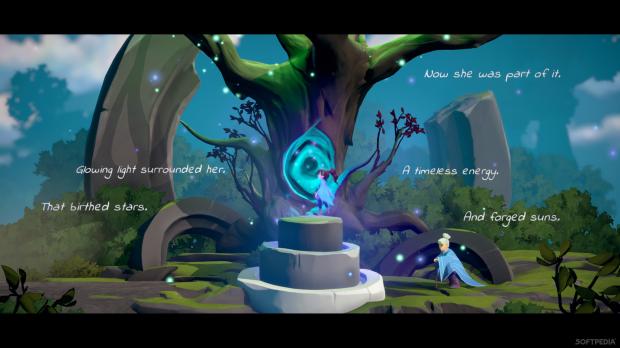Although you may not have heard about it until now, Lost Words: Beyond the Page is not a new game. For a year, up until very recently, it was a Stadia exclusive, that was finally launched for other platforms as well, including consoles. Now everyone has the chance to try this platformer with plenty of soul, with a novel take on storytelling, but also full of quirks typical to an indie title. Is the game worthy of the critique’s praise and the multiple awards won at different trade shows? Read on to find out.
Just as many other indie titles, Lost Words: Beyond the Page is based on a personal story, that hits close to the heart, but also with an ace up its sleeve. Our adventures in the vibrant fantasy world of Estoria have been dreamt up by a quite well-known author: Rhianna Pratchett. The daughter of Terry Pratchett, the creator of the Discworld universe, Rhianna managed to build a rename for herself working on games such as Risen, Mirror’s Edge, or Tomb Raider. After dabbling in the world of high-budget games, through Lost Words: Beyond the Page, Rhianna tells us a story about loss, about escaping reality and facing the demons that haunt us in real life.
It all starts with young Izzy, an ordinary girl with an extraordinary imagination, who dreams to grow up to become a writer. She starts her career with a journal, the most precious gift received from her grandmother. The blank pages soon turn into fertile soil sprouting a fantasy world, based on the personal ups and downs our young hero has to face in her day-to-day existence. Soon after creating Robyn, her alter ego, Izzy, will have to learn to cope with loss and deal with a cascade of emotions, both positive and negative. Her solution is to escape into the world of Estoria, where Robyn has to battle dragons, make friends and solve challenges.
Each chapter of the game is comprised of two distinct, yet strongly connected parts. During the first, you control Izzy as she jumps, falls, and climbs on the words serving as platforms in her journal. Sometimes you must choose the right words, other times you have to put them in the right order to be able to find the exit hidden on the page. Turning the journal into an interactive, vibrant and rich experience is the most innovative part of Lost Words: Beyond the Page. This is not just about navigating a maze built up by words put on a page, but an engaging way to connect to Izzy and her emotions. This part of the game is also accompanied by beautiful and imaginative visuals that make you feel present in the life of our young hero.
The second part of each level teleports you to Estoria, putting you in the role of Izzy’s alter ego, Robyn, who has to go through a series of trials to save her village. In both parts, the game is built on a 2D side-scrolling approach, with some ultra-light puzzling elements thrown into the mix. Robyn’s hunt for the dragon is based on some choices you make during the diary phase and uses words for magic purposes. During these adventures, you will come across some words that have the power to lift or destroy the obstacles in your way, repair the surrounding structures, or illuminate the darkness.
Nothing is very complicated in the game and there is no real challenge. Of course, there are some collectibles hidden here in there, and there are some choices that influence some minor aspects of the story, but the game focuses more on the atmosphere, rather than complex gameplay. The initiative journey of Izzy and Robyn are on center stage, every other element of the game playing a support role. From the game mechanics to the story and the production value we can say without a doubt that Lost Words: Beyond the Page is intended for young adults. There is no violence, no fights, no high-end realistic graphics, only exploration both outside in the game world, and inside in the heart of Izzy presented through innocent visuals.
The game is absolutely linear and the different choices you have to make will not influence the outcome of the story. But this time it truly is not about the destination, but about the journey. It is about how you deal with loss and the plethora of emotions it brings with itself. It is about growing as a person and escaping into fantasy worlds to better understand your world. The scenario, the way the story is told, the connection between the diary pages and the characters you will meet in Estoria, the carousel of emotions Izzy is going through, the simple yet meaningful gameplay make Lost Words: Beyond the Page into a flawed game, yet a magical experience.
As already mentioned the diary pages are the best part of the game, especially visually. Unfortunately, there is a big discrepancy between the creative world told and drawn on the pages, and the flat and much more conventional fantasy world of Robyn. Somehow the illustrations of Izzy’s world are much more creative and fantastic than the imaginary world of Estoria. The soul and personality of the game visually lie with Izzy, Estoria being graphics-wise too mundane and tame. The music of the game contributes to the overall atmosphere, while the voice acting does a fair job bringing to life both our protagonists.

The Good
- A truly emotional story
- Beautiful, creative diary pages
- Novel story telling mechanism
The Bad
- Visually flat world
- No real challenge with childish puzzles
- Not enough word magic
Conclusion
There are some original and innovative ideas in the game, but in the end, is a very casual experience. Those who love a good story will love Lost Words: Beyond the Page. But those who are looking for deep gameplay, have nothing to see here.

Be the first to comment